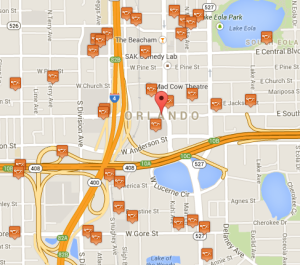Should You be Worried About Buying Property Near Petroleum Contamination Sites in Orlando
Unfortunately, petroleum contamination is extremely common in Florida and many other states. In fact, if you turn on the Petroleum Contamination points on our MoveMap, you’ll see a pretty depressing sight. The petroleum sites in  Orlando alone number in the hundreds. This is a concern in Florida because in most of the state, groundwater is very close to the surface and it provides drinking water to around 90% of residents. Fortunately, the Florida Department of Environmental Protection (FDEP) tracks petroleum releases and in some cases helps remediate (clean up) the sites. In this post, we’ll talk a bit about how petroleum releases happen in Orlando, why they’re so common, and finally, what the implications are to you as a resident.
Orlando alone number in the hundreds. This is a concern in Florida because in most of the state, groundwater is very close to the surface and it provides drinking water to around 90% of residents. Fortunately, the Florida Department of Environmental Protection (FDEP) tracks petroleum releases and in some cases helps remediate (clean up) the sites. In this post, we’ll talk a bit about how petroleum releases happen in Orlando, why they’re so common, and finally, what the implications are to you as a resident.
The reason so many sites can be seen on the MoveMap for petroleum contamination shouldn’t come as a surprise; it is simply because petroleum use is extremely common and accidental releases occur frequently. A recurring cause of soil and groundwater contamination is leaking underground storage tanks. Storage tanks are commonly found at gas stations but also exist near backup generators and other equipment. Since Florida is prone to hurricanes, backup generators are especially numerous here, and their fuel tanks do occasionally leak. Unfortunately, gas station and generator tanks can give out without anyone noticing for quite some time. In such cases, gasoline or diesel fuel can drain out of the rupture point and contaminate soil and groundwater. Factories, junkyards, mill sites, shipyards and transit stations can also be causes of petroleum contamination. Accidental spills of gasoline, diesel, jet fuel and used oil contribute to the situation as well, though spills of under 25 gallons are not required to be reported to FDEP as long as the spill and affected soil are cleaned up immediately. While the geographic area affected by oil contamination tends to be fairly constrained in the case of gas stations and other tank failures, the area contaminated by petroleum can be quite large in junkyards, factories and the like.
Depending on the nature of the soil and groundwater flow, the petroleum contamination may stay fairly contained within the site or expand out beyond the actual property boundaries. Since gasoline and diesel fuels are lighter than water, they tend to “float” in the upper part of the water table. Over time, the fuel will tend to move with the groundwater currents causing an elongated plume. While the results sound bad, the fact that petroleum floats is generally good news for Florida residents since most people on well water tap the Floridan Aquifer, which is very deep underground. However, petroleum can and does occasionally poison drinking water wells, and chronic exposure to oil products can affect the nervous system, blood and kidneys. Furthermore, petroleum contains benzene, which is a known human carcinogen. So if there is a contamination point located near your home or a piece of real estate that you are considering buying and a well is used, it might be a good idea to get the water tested from time to time.
The state of Florida does operate a petroleum cleanup program, but it is complex and the details are outside the scope of this blog post. Generally speaking though, once the government has identified an area which requires cleanup, it will either excavate the soil and process it to remove contaminants or place that soil in a landfill. Contaminated groundwater may also be removed and processed before being re-released into the environment. Depending on the nature of the site, groundwater monitoring equipment might also be installed.
Petroleum contamination is an unfortunate consequence of our modern standard of living and it does have implications for home buyers and renters in the Orlando area. However, most petroleum contamination happens in commercial and industrial areas where people do not live. In many cases therefore, it tends to be more of an environmental concern than a direct threat to human health. Nevertheless, if you’re considering buying property close to a contamination site in Orlando Florida, it’s a good idea to get your well water tested. To check out petroleum contamination in Orlando and other areas of Florida, have a look at our MoveMap over at www.moversatlas.com.

